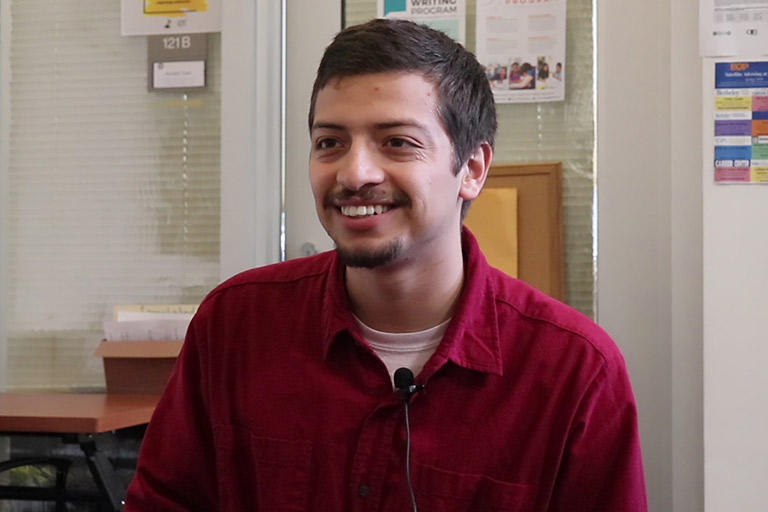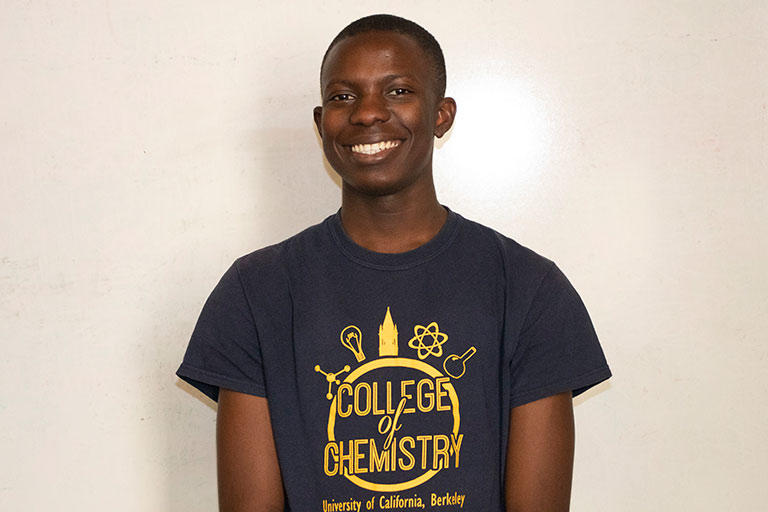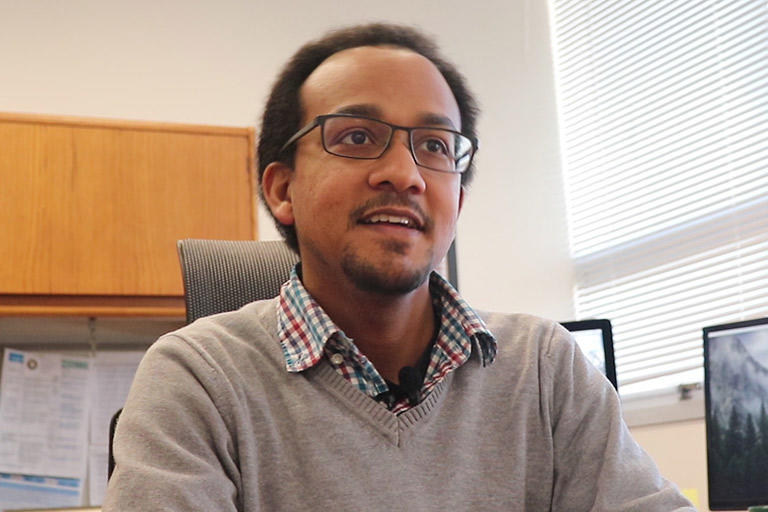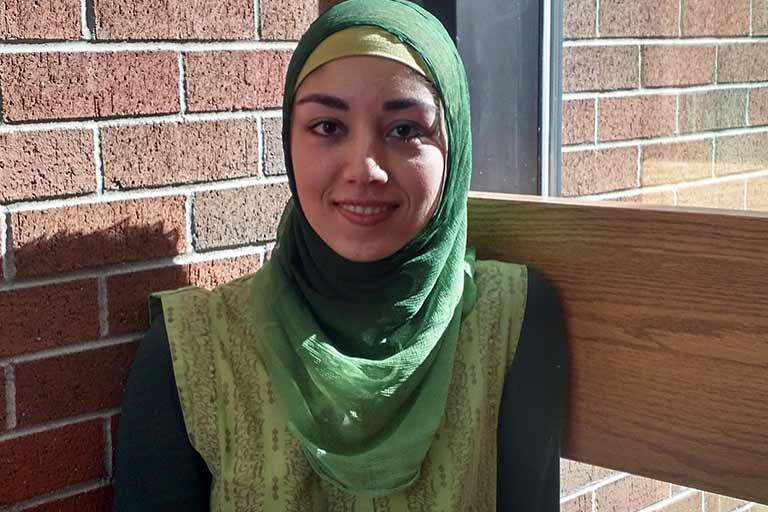The UC Berkeley College of Chemistry is a place where students who are under-represented in STEM can thrive!
Michael Rivas Valadez, Chemical Engineering B.S. Student, Class of ‘20
Michael Rivas grew up in Granada Hills, in California's San Fernando Valley. He didn't have much guidance when applying to college, but he knew that UC Berkeley was a highly ranked institution and he wanted to go to the best school he was admitted to. His transition from high school was rough because he had to revamp his study habits. His GPA suffered early on because he wasn't prepared for the level of learning required at Berkeley. After his first year, though, he adapted successfully. Joining the Berkeley student chapter of AIChE (the American Institute of Chemical Engineers) introduced him to supportive fellow students who he studied with, and his grades improved!
Michael advises prospective students to consider their preferences when choosing a university. If you enjoy challenges and can adapt quickly, then UC Berkeley is a good choice.
David Sanchez, Chemistry B.S. Student, Class of '22
David Sanchez went to high school in Monterey, CA and identifies as LatinX, non-binary, and queer. He came to Berkeley because it has "the best Chemistry program in the world." He's excited to be somewhere where there's so much amazing research going on. David's transition to Berkeley was challenging because he was expecting more diversity on campus. Eventually he found resources and safe spaces that support him as a person of color, including LGBTQ and LatinX groups, and a Spanish-speaking community. He also started studying with study groups for the first time.
David advises prospective students to cut themselves some slack. Coming to Berkeley involves a lot of change and learning. It's okay if things aren't perfect--it takes time to build a new routine and to feel comfortable. Also, he recommends doing things that bring happiness outside of academics. And his most important advice is that it's okay to ask for help!
Alejandro Cuellar-De Lucio, Chemistry B.S. Transfer Student, Class of '20
Alejandro Cuellar- De Lucio was born in Tijuana, Mexico. When he was 13 his family moved to the U.S. for education and other opportunities. They settled in Long Beach, CA where he completed high school and began his studies at Cerritos Community College. Despite being nervous about chemistry, Alejandro loved the material. His chemistry professor became his mentor and encouraged him to do an internship in solar cells and organic polymer synthesis, which confirmed his desire to pursue Chemistry as a major. Although being admitted to the College of Chemistry was a significant accomplishment, Alejandro's transition to Berkeley was hard in the beginning--he felt like he didn't belong. But after getting to know people, especially other transfer students, he found they had similar challenges and backgrounds. There were also a lot of great resources on campus, including for undocumented students like him.
Alejandro recommends that new students create a network of friends and fellow students who can definitely help during the transition from high school or community college.
Anthony Omole, Chemical Biology B.S. Transfer Student, Class of '20
Anthony Omole is from Nigeria and moved to the U.S. in 2014. He decided to come to Berkeley "as a gift to myself and my family for the struggles we've gone through as an immigrant family in the U.S." Anthony spent his first semester exploring his identity as a black person via black student groups and community events. The shared understanding of black struggles has been monumental in how he defines himself--and he is still learning how to occupy space as a black person in a place that is not black.
Although transfer students have limited time at Berkeley, Anthony got involved in undergraduate research in the Francis lab. His research group is very supportive and he received financial support from the College of Chemistry to continue research over the summer and to present his findings to a national organization for black chemists and chemical engineers in St. Louis.
Anthony reminds new transfer students that time at Berkeley is short, and to make campus connections. Also, take classes for fun!
Grace Hamaker-Teals, Chemical Biology B.S. Student, Class of '22
Grace Hamaker-Teals grew up in a small town in Eastern Washington called Kennewick. Her parents are both teachers and educators. As a child she was very interested in science, reading fantasy and imagining inventions, which led her to a fascination with the possibilities of biology and chemistry. Grace wanted to come to Berkeley because it's a really big school with a prestigious chemistry program. Her favorite resource is the CoC tutoring center, where she gets help with her chemistry, physics, and math classes. She also regularly attends her professors' and graduate student instructors' office hours. Grace's advice to new students is to go to class even if it's at 8:00am. And to create realistic class schedules. Also, if you were invited to participate in Summer Bridge, you should go! It bridges the learning gap between high school and college, eases the transition, and helps create a support network of friends.
Professor Keith Alexander, Chemical and Biomolecular Engineering - Product Development Program
Professor Alexander is a native of Oakland, CA who transferred to UC Berkeley from a community college. He went on to earn his Ph.D. in Chemical Engineering from Berkeley and an MBA from Stanford. When he began his education he intended to major in music, but an interested faculty member encouraged him to try an introductory Chemistry class. He found Chemistry to be a challenging and interesting way to think about the world and from there he discovered an interest in Chemical Engineering. He was inspired by the ways in which engineers turn discovery into reality. Professor Alexander currently leads the Product Development Program, a professional Master's program for scientists who wish to leverage their technical backgrounds in non-traditional ways. Out of all of his accomplishments he is most proud of watching his students grow and develop. He believes that diversity is at the heart of great problem-solving because diverse teams are more creative and stretch the boundaries of possible solutions. He encourages new students to be persistent because although STEM is challenging, it does get easier.
Professor Kwabena Bediako, Chemistry
Professor Bediako grew up in Akropong, Ghana and came to enjoy chemistry as a high school student after realizing the extent to which chemistry explains the world around us. He began with an interest in biochemistry but fell in love with inorganic chemistry in college. He chose to work in the College of Chemistry not only because it's the top department in the world, but because of the strong culture of collaboration amongst faculty. His current research focuses on problems at the nexus of energy, the environment, and technology. His group is trying to understand the fundamental chemistry and physics that will allow us to be a more energy efficient society. He believes that in order for students to thrive intellectually they need to be in an environment where diverse viewpoints are welcomed. He enjoys teaching undergraduate students because it is rewarding to watch them discover new worlds and possibilities. Professor Bediako wants students to know that they have an important contribution to make. His advice for success is to find a faculty person to serve as a mentor.
Negar Beheshti Pour, Chemical and Biomolecular Engineering
Born in Tehran, Iran, Dr. Beheshti Pour received a bachelor's degree in Polymer Engineering from Tehran University and a Ph.D. in Chemical Engineering from Washington State University. From a young age she was interested in how polymers touch every part of our lives, from everyday items like grocery bags, to sophisticated technologies like biopolymers used in tissue engineering. She is happy for the opportunity to work at the College of Chemistry because of its top ranking but also because there is value placed on engineering education and innovative teaching pedagogy. Her research focuses on experiential learning and she has been involved with creating affordable desktop learning modules for fluid mechanics and heat transfer. The modules allow students to conduct experiments at home and see the phenomena in action. Dr. Beheshti Pour believes a diverse educational environment and culture of inclusion are important because it prepares students for the real world. There is nothing more inspiring to her than the look in the eye of a student experiencing that "aha moment" of understanding. She advises students to pay attention to all dimensions of life--spiritual, intellectual, physical, and social.
Professor Markita Landry, Chemical and Biomolecular Engineering
Professor Landry was born in Canada and is of French-Canadian and Bolivian descent. She earned a Ph.D. in Chemical Physics from the University of Illinois at Urbana-Champaign and completed a postdoc in Chemical Engineering at MIT. Her research currently focuses on developing probes that can be used to image when and where chemistry happens in the brain. Those images will make it possible to learn how neurons are affected by drugs of abuse. Professor Landry believes diversity is important because a person's background and experiences shape the way they do science, and having diverse voices in the room increases the likelihood of finding an answer to a problem. She will always be most proud of the scientists that she produces through her lab and undergraduate teaching. She enjoys exposing students to new science, and advises them to take advantage of everything Berkeley has to offer because the undergraduate years are a time to explore and expand one's horizons.
Professor Richmond Sarpong, Chemistry
Born in Ghana, Professor Sarpong moved to the U.S. for college, eventually earning a Ph.D. from Princeton University. After graduate school he completed a postdoc at CalTech. His passion for chemistry began in his childhood when he learned that a chemist could impact millions of lives by creating new medications. His research focuses on using readily available materials to make medically important compounds that can address diseases like cancer, Alzheimer's, and Parkinson's. His group is also working to make medicines more affordable and accessible to people throughout the world. He chose to work in the College of Chemistry at Berkeley because of the dedicated and impressive students. He finds Berkeley students to be truly inquisitive and interested in making a difference in the lives of others. Professor Sarpong believes that a diverse approach to problem solving leads to better solutions. He advises students to interact with other students and faculty, because there are many opportunities at Berkeley but one must seek them out.










